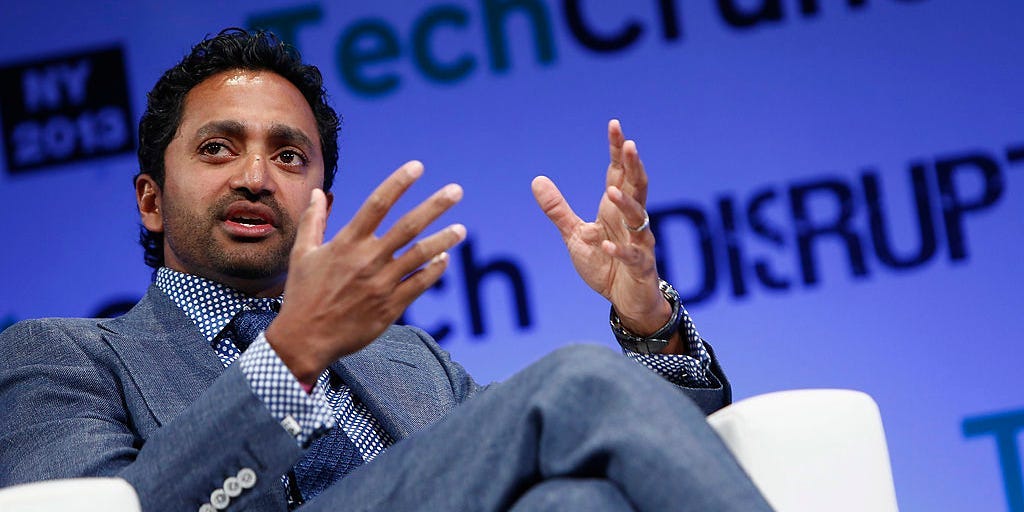
Brian Ach/Getty Images for TechCrunch
- Chamath Palihapitiya sat down with Bloomberg on Friday to discuss a wide variety of topics.
- The Social Capital founder said, “Nobody’s going to listen to Warren Buffett. There have to be some other folks that take that mantle.”
- The billionaire also touched on the SPAC boom, cryptocurrencies, and even a big tech breakup. Detailed below are his 10 best quotes.
- Sign up here for our daily newsletter, 10 Things Before the Opening Bell.
Billionaire Chamath Palihapitiya sat down with Bloomberg on Friday to discuss everything from Warren Buffett to cryptocurrencies in a whirlwind interview.
As a leader in the ongoing SPAC surge and Reddit trader movement, the founder of the VC firm Social Capital has been the talk of the markets lately.
Palihapitiya fashions himself as a figurehead of the times, arguing that titans like Warren Buffett no longer have the energy nor the lexicon to lead the markets as they have for decades.
His thoughtful critiques of market trends, issues, and participants have made him a regular on all the major market news networks. But it’s Palihapitiya’s modern takes and social media prowess that have allowed him to connect with the general public, growing his fame.
To learn a little bit more about what the billionaire former Facebook man has to say about all things markets, we’ve put together the top 10 quotes from his interview on Friday.
On Warren Buffett:
1. "Nobody's going to listen to Buffett. Buffett doesn't have the energy to say what he said 30 and 40 years ago in 2021. And that's OK, he's basically earned the right to chill out and be the GOAT, but there have to be some other folks that take that mantle, take the baton and do it as well to this younger generation in the language they understand."
On Twitter being his preferred platform
2. "I am is a byproduct of my generation and media culture, which is faceted. Not always great facets, but multifaceted. And so you have to speak in the language of the times in order to get your point across."
On the GameStop saga, hedge funds, and short-selling:
3. "I doubt that, in the end, in the final analysis, that there was any collusion of any kind. But just the stench of this whole thing just goes to show you how difficult it is for normal everyday folks to have access to any kind of return. So if we break down the capitalist philosophy, they are just fundamentally stuck in this cul-de-sac of always being labor. And always being sort of at the ownership of capital, of the ownership class."
4. "I still think hedge funds will do well. I still think that there are some folks who are incredibly talented who will make just a ton of money for themselves and their investors. But I think disclosure needs to go up."
5. "In terms of short-selling, I buy the fact that it's an important part of the market. I'm not a huge fan of it. I do think that certain folks really use it to run a neutral strategy, and ya know, I think that that's great. But I also think that now, in the world of social media, and we've seen this recently, disinformation can be used to not just cause political damage, but disinformation can also cause economic damage. And so, I think that the SEC is going to have to deal with that issue and figure that out."
On SPACs
6. "I think that SPACs are very much here to stay. Using the language of inequality, it evens the playing field. It democratizes access to high growth companies. How? Because it allows retail and it allows long-tail institutional investors. Folks that might not have necessarily been tier one hedge funds, now they can also play."
7. "When I used to manage institutional capital in early-stage investing, I charged a 30% carry, no hurdle, no nothing. And people were willing to be that I could generate returns, and I have, you know, 30-plus percent over the last decade, that justified a 30% carry. Similarly, here on the deals that I do, I take a 20% carry. And I think that I can find targets and opportunities that will make that more than reasonable in the final analysis."
On cryptocurrencies
8. "I am building a fairly sizeable portfolio of what are called NFTs, non-fungible tokens, some digital art, some virtual trading cards, and these may sound crazy to some, but I do think that that's the next frontier of digital currency and digital assets. So I have been building a portfolio."
On a big tech breakup
9. "Well, I think they need to get regulated. I think that companies like Facebook and Google will be subject to much stricter laws. Section 230 will change and recognize them as quasi-publishers."
10. "For Microsoft, Apple, and Amazon, I don't think much is going to happen. The reason is because I think that those guys are generally on the right side of history, and they generally don't err towards the type of hot button issues that politicians care about. Facebook and Google threaten the institutionalized structures of power and influence that codify politics. Amazon Prime doesn't do that."
